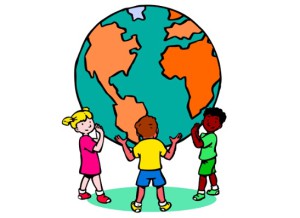EDUCATION FOR PEACE .
Excerpts from the Manual for the Peaceable School, submitted to CPNN by John Zant
This programme, The Peaceable School, was designed in 1999 for use in Dutch primary schools to improve the social and emotional climate in school and classroom, by teaching pupils and teachers how to resolve conflicts constructively and by promoting pupil participation and community- building. The Peaceable School is widely spread in The Netherlands: by 2007, approximately 300 primary schools have implemented the programme (a yearly increase of approximately 50 schools). . .

The Peaceable School has become a programme that strives to make school and class into a democratic community in which everyone feels responsible and involved, with the resolution of conflicts as its starting point. This programme teaches pupils, teachers and parents skills for resolving conflicts, other than by (physical or verbal) violence.
The programme includes a series of lessons for all age groups (including activities for children in Pre-school), intensive training for teachers, classroom observation and coaching and workshops for parents (see section 4). Besides training in conflict-resolution skills, all those involved learn to live with each other in a positive way by setting high standards of behaviour towards each other.
Increasing the responsibility of the pupils for their class and the school is key to this: the school as a community. Pupils learn to be responsible for the resolution of problems in the class and at school. Peer mediation is the most obvious result.
In this programme, peer mediation does not stand alone, but is part of an extensive curriculum. Through the weekly lessons, the pupils gradually work towards a climate in which the resolution of conflicts, other than by violence, becomes normal. Only when all the pupils know what mediation is and have practised it, does the school train a number of them specially as mediators.
Research results of surveys of similar programmes in the U.S. are encouraging. Evaluation research shows a significant reduction of incidents, suspensions, insults, punishments, etc. in all the schools that have implemented conflict resolution and peer mediation (Metis Associates, Inc., The Resolving conflict creatively programme: 1988-1989. Summary of significant findings. New York, 1990). Nearly all the schools report improvement in the general school climate. A large survey of 15 schools in New York, in which 5000 7 to 11-year-old pupils were followed, shows a significant decline in aggressive behaviour and a significant rise in achievement in reading and arithmetic by pupils who had followed more than 25 lessons from the curriculum (Aber J.L., Brown J., and C.C. Henrich, Teaching Conflict Resolution: an effective school-based approach to violence prevention. The National Center for Children in Poverty. New York, 1999).
After two years, nearly all the schools working with The Peaceable School in The Netherlands report a considerable change in the culture. Simple measurements (with thermometers, check-lists, observation) show progress in the actual and sensed feeling of security in almost all the schools.